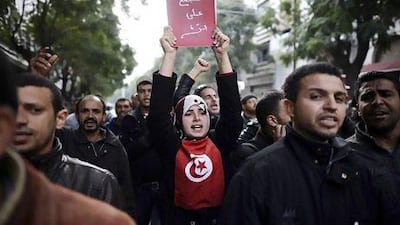TUNIS // The demonstrators hung around outside the justice ministry. Some were men with long beards waving the black flag resonant of Islamic wars of long ago, some were rakish revolutionaries and one was Iman Abdelli, a young woman in a headscarf holding a sign.
"Free the Salafis," read her sign in Arabic. "Replace them with the RCDistes." The first reference is to the hundreds of Muslim hardliners jailed after some of them attacked galleries, concerts and eventually the US Embassy in September last year. The second is to the former ruling party of Zine El Abidine Ben Ali, the president ousted after a popular uprising two years ago tomorrow.
"The problem in this country is religious racism," Ms Abdelli declared, condemning what she saw as the government's agenda against religious people, before digging out a copy of the draft new constitution and outlining her concerns with various laws.
Ms Abdelli's anger was reflected on Friday in the rather liberal Tunisian press, much of which is also opposed to the government, but on a different issue. The newspapers' outcry was over a blogger, Olfa Riahi, who was banned from travel after alleging that the minister for foreign affairs misused government money.
The two issues sum up the problem the government faces: in times of revolt, you cannot please all the people all the time. More than a year after democratic elections installed the current government, its leaders are at risk of pleasing no one.
Tomorrow will be marked with festivities, visiting heads of state and ceremonies in the elegant old Kasbah area of Tunis, now ringed with razor wire after numerous violent protests. But 10 minutes' walk away, in the city centre, discontented people will likely gather to call for a new revolution.
The gripes against the government are various and widespread, but the fiercest are economic. The impoverished interior of the country, where the uprising began, has seen little improvement in its problems of unemployed graduates and lack of investment and infrastructure.
Speaking off the record, one senior official in Tunis said he was dismayed to learn that investment along the historically more prosperous coast had actually increased. The official blamed leftist groups and trade unions in rural areas for staging frequent strikes and violent demonstrations that scared off international investment.
Demonstrators in the rural areas are more likely to blame the government for neglecting them. But in the budgets since 2011, there has been a dramatic increase in the amount of money allotted to investment in Tunisian projects, an effort by the government to alleviate the jobs crisis.
One adviser to the government said that it was the impenetrable bureaucracy of a country where business was long synonymous with cronyism that stymied well-meaning efforts to set up job-creating investment projects.
Reforming the system is painfully slow and stalled by disagreements between the government and historically powerful unions. Tomorrow, one of the sideshows of the celebrations will be the signing of a pact between government and labour groups to rework the labour code, a significant step but one that will do little in the short term to dampen the anger of unemployed youth.
Other flashpoints between people and politicians stem from the role of religion in the new Tunisia. The moderate Islamist group Ennahda garnered a hefty majority in 2011's election but have disappointed some people by being too Islamic and others by not being Islamic enough.
Controversial clauses in the draft constitution on women and blasphemy were met with demonstrations by people fearful that an Islamist-led government would put curbs on their freedoms. But the small but vocal minority of hard-line Islamist groups have criticised Ennahda for not insisting on the implementation of Islamic law.
"The reality is that in one year or so, you can't change much," said Seyyed Ferjani, a senior Ennahda member. "And experience is lacking in some fields ... when you have a bad bureaucracy like this, you have to know how to navigate it. Some ministers were good, and some weren't up to it."
"A lot of people are disappointed, they call it the failure government," said Monica Marks, a doctoral candidate at Oxford University who is currently conducting research in Tunisia. "The question is: is the opposition going to unite? Who will fill the space of the protest vote, the people who are angry with Ennahda but don't know where to go?"
A recent video on Facebook satirised the dilemma, showing cartoon versions of party leaders gyrating to the hit South Korean song Gangnam Style. The Ennahda leader Rashid Ghannouchi, Beiji Caid Essebsi, who leads a party which draws its support from the bourgeoisie; and Hamma Hammami, a communist leader, are mocked for their various political weaknesses. The secular parties Ettakatol and Congress for the Republic, which form the governing troika with Ennahda, have been criticised for not having any impact on the Islamists.
But the voters' choice may not be a factor for some time. Elections tentatively scheduled for June may be delayed further, the overdue constitution shows no sign of completion and even a long-awaited cabinet reshuffle has been postponed again.
Optimists see the political wrangling and frequent protests as being symptoms of a new democracy. The demonstrators outside the justice ministry last week were eyed by soldiers who seemed unmoved by their demands, but unlikely to try to move them on.
"It's the only result of this revolution," said one of the demonstrators, Wejdi Khadrawi. "People are no longer afraid to participate in society.

